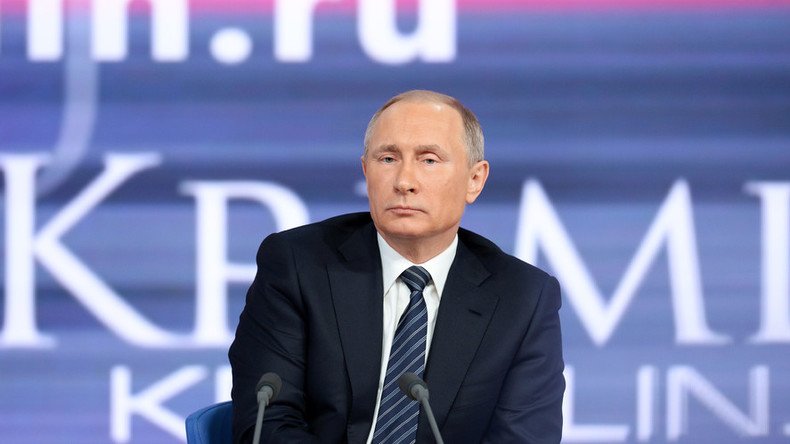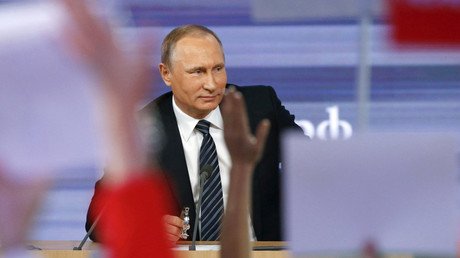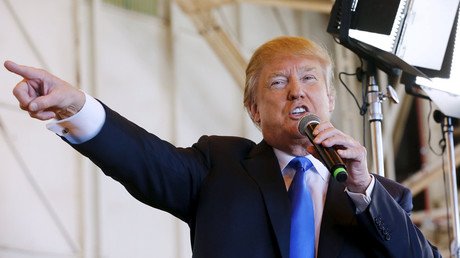Putin wraps up 2015: Three hours of questions, 1,400 journalists & one star of the show

The 2015 installment of Vladimir Putin's now-traditional end-of-year Q&A lacked some of the sparkle of previous years. However, the Russian President captivated his audience for over three hours and addressed a host of serious issues.
Throughout human history, leaders have devised countless methods of communicating with those they lead. The ancient Romans boasted the Forum, a rectangular plaza which hosted elections and political speeches. Later, Popes used the Papal Bull to send orders to faraway places. Meanwhile, Victorian British administrators, with literacy rising sharply, used newspapers to interact with the public.
In Russia, distance has always made Moscow seem remote to residents of regional cities. While British or French politicians can move from town to town with relative ease, it’s far harder for Russians. Moscow to Vladivostok is a 9,157 kilometer drive for anyone crazy enough to attempt it. By contrast, London to Inverness is a mere 914 kilometer spin and Paris-Nice a manageable 932 kilometers.
Thus, for hundreds of years, Russia’s rulers were more concerned with keeping order in the vast country than engaging with the general public. The idea of Josef Stalin, Leonid Brezhnev or Tsar Nicholas II explaining their actions in Town Hall meetings or later utilizing live TV is completely laughable. Even in the 90’s, advisors to Boris Yeltsin, Russia’s first democratic President, never countenanced anything like it. The potential fall-out from Yeltsin, a bottle of vodka and millions of TV viewers is too appalling to countenance.
Hence, while West European countries are used to intense debates where leaders are grilled mercilessly, Russians are not. In fact, in the UK, via broadcasters like Jeremy Paxman and John Snow, political interviews have turned into a sort of blood sport. So, in Russia, the fact that Putin is willing to face more than three hours of annual questioning from various journalists is a major novelty.
The Putin show
Western media often likes to criticize Putin's Q&A as a "stage-managed publicity stunt." If it were so tightly controlled as they allege, why would questions be allowed about his family and alleged corruption among relatives of the Moscow elite? Also, does anybody seriously believe that Barack Obama, to name one Western leader, would survive three hours of unscripted questions without a teleprompter? Whatever you might think of him, there is no doubt that Putin's grasp of his brief is quite remarkable.
Putin's Q&A has elements of a carnival and pure showbiz. Over 1,400 media professionals from all over Russia and the world straining to get the President’s attention. Some flatter him, like the regional reporter who complimented Putin on his physique. “The thing is, as a woman I can’t help but compliment our president on the fact you are in such good sporty condition,” she raved. “Thank you so much for this, because our young men take your example, it’s true! And so many more young people now play sports,” she added.
Others took a decidedly aggressive tone. Ekaterina Vinokurova from the Znak news website asked about allegations of corruption involving the sons of Chief Prosecutor Yuri Chaika. Another interrogated Putin on American media reports concerning his daughters. “I also read that my daughters were studying abroad. I'm proud of them. And they never left Russia. They got their education here. They are neither into business nor politics,” he shot back.
Putin: "I never discuss my family: my daughters are not involved in business or politics"
— Steve Rosenberg (@BBCSteveR) December 17, 2015His answer completely contradicted Western reports that his children had lived in and studied in Holland or Germany.
As usual, Putin seemed to revel in foreign policy questions, apparently trolling the West at times. When questioned about relations with Turkey following Ankara’s shooting down of a Russian jet, he countered that perhaps the Turks “wanted to lick the Americans in one place.” He then seemed to dare Turkey to try it again, now that Russia has sophisticated air defense systems in place. “Turkey used to violate Syrian airspace all the time,” Putin said. “Let them try and fly there now,” he implored, noting that Russia’s S-400 can hit any target in Syria.
In a post-conference huddle, he praised Donald Trump, the US businessman turned Presidential candidate, “There is no doubt that he is a very bright and talented man,” he claimed. “It is not our business to assess his merits; that is up to the US voters. But he is an absolute leader of the presidential race.” Oddly, Trump is a kind of ideological bedfellow of Vladimir Zhirinovsky, the clown prince of Russia's opposition.
Earlier, Putin suggested that embattled FIFA chief Sepp Blatter should be awarded the Nobel Peace Prize.
Foreign policy & domestic challenges
Since his lightening 2007 Munich speech, when he outlined diplomatic parameters he has steadfastly followed since, Putin has frequently used press events to harangue American aggression globally. This time he didn’t. Instead, Putin praised John Kerry’s efforts to bring peace to Syria. He also left the possibility of an alliance between Western powers and the Russian-led alternative coalition.
It was also notable that Ukraine was barely mentioned. That said, in response to a Ukrainian reporter’s poser about Russian influence in the country, he did concede that: “We never said there were no people there solving certain questions, including in the military sphere.”
When Mikhail Saakashvili, a long time Putin bête noire who led Georgia into a disastrous 2008 war with Russia, was mentioned, Putin couldn’t resist poring scorn. Referring to the bizarre re-emergence of Saakashvili in Ukraine - he’s a wanted criminal in his homeland - Putin said bluntly: “The US didn't give Saakashvili a working visa, so they sent him to Ukraine. It's a spit in the face of the Ukrainian people.” Putin then suggested that Moscow may remove visa restrictions for Georgian nationals.
With low oil prices, and Western sanctions, causing difficulties in the Russian economy, Putin’s main focus was to reassure Russians that his government was fully in control of the situation. He told Russians that living standards were not in danger and that the economy was now bouncing back. He also referred to successes, such as the dramatic increase in life expectancy, now averaging 71, compared to 65 when Yeltsin stepped down.
Putin also revealed that Russia’s Syria campaign wasn’t a drain on public finances. He pointed out that expenses were being met from the military training budget. Indeed, a frequent complaint in Moscow is that, compared to NATO forces that have been battle-hardened by, often illegal, wars in recent decades, the Russian army lacks “match practice.”“It’s hard to imagine a better training drill,” Putin related.
For years, the annual Putin Q&A has been a pre-New Year highlight, filled with drama. For instance, two years ago he pardoned the notorious criminal Mikhail Khodorkovsky at the gathering. However, this year was a damp squib by comparison. The reason is quite simple. Because of Syria, ISIS and the dramatic events of recent months, we’ve had Putin overkill. The Russian President will be hoping that 2016 is calmer.
The statements, views and opinions expressed in this column are solely those of the author and do not necessarily represent those of RT.















